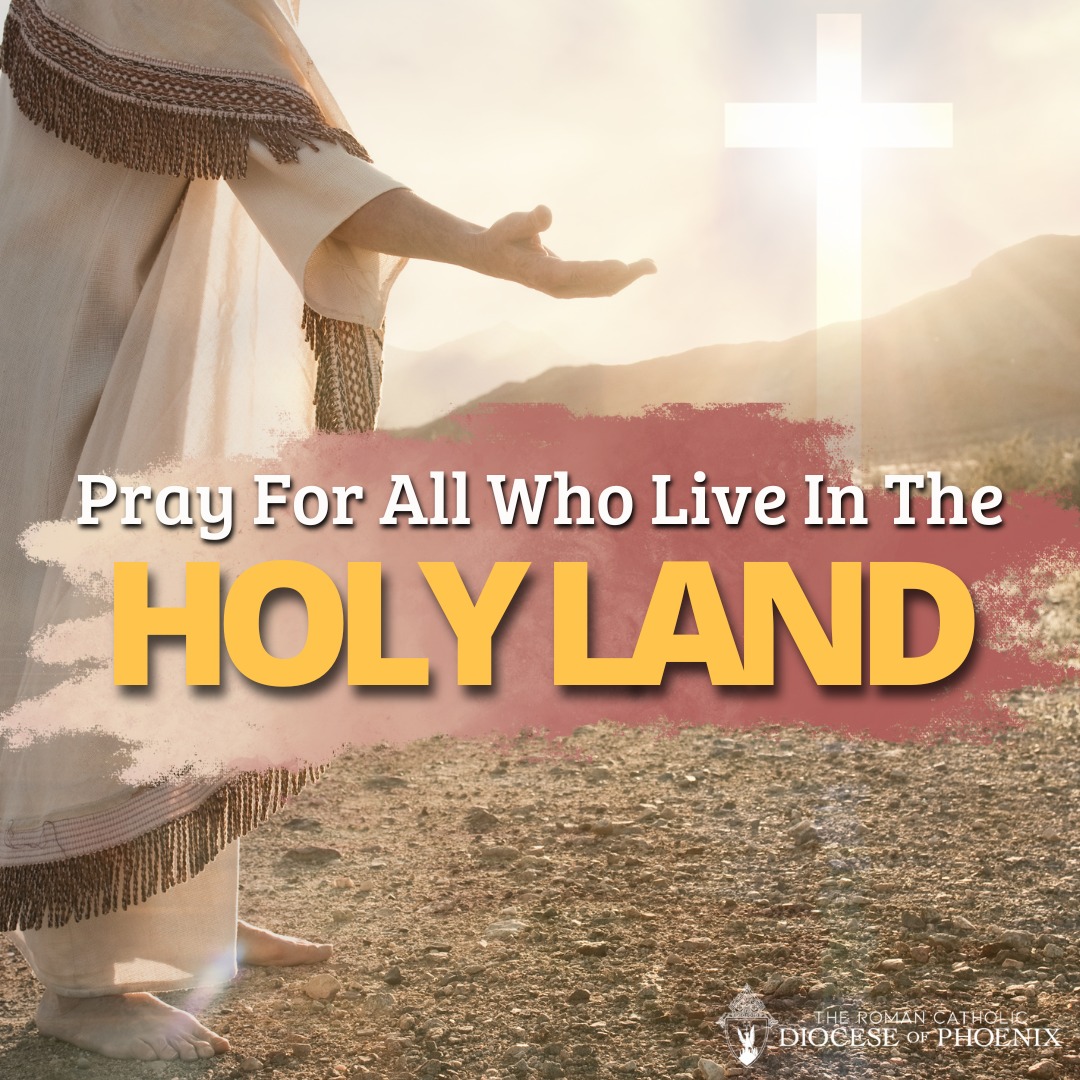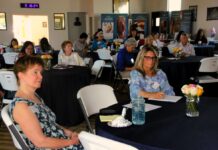As the death toll in Israel continues to rise, surpassing 1,200 as of Tuesday evening, Fr. Craig Friedley, pastor of Our Lady of Guadalupe Parish in Queen Creek, is now back home unharmed after a harrowing few days abroad.
He and a group of about 20 parishioners, along with dozens of travelers from other parishes in the Diocese of Phoenix, had just begun their tour of the Holy Land when war broke out.
“I was actually in the country less than 16 hours I think before the rockets started going off and the air raid sirens started going off,” Fr. Friedley said.
Having served as a fighter pilot for 13 years in the U.S. Air Force, the noise and tense situation weren’t unfamiliar to him. This was no drill, however.
“When I was in the military, you hear those kinds of things,” Fr. Friedley said, “except when you’re over there in Israel and those sirens go off, it’s not training, and it’s not practice.
“It’s the real thing.”
Fr. Dan McBride, pastor of St. Mary and St. Juan Diego Parish in Chandler, has travelled to the Holy Land multiple times and was there just a month ago. Some of his parishioners were on the pilgrimage with Fr. Friedley.
Having spent a semester studying in Israel while he was a seminarian, Fr. McBride has somewhat of an insider’s view of Israel but didn’t see the attack coming.
“Actually, my observation from a month ago was that it was one of the most peaceful times I’ve seen Israel in the four different trips I’ve taken there,” Fr. McBride said.
“The folks I talk to realize that political tensions are high in Israel, but that fragile peace has been holding. So, it was kind of a shock when Hamas attacked Israel and began that whole series of attacks.”
His semester in Israel took place years ago during what’s known as the Second Intifada, or uprising.
“It was always in the back of your mind that there was a possibility for violence, but the violence was always contained,” Fr. McBride said.
“I’m always cautious when I’m there, but the idea of them driving into a kibbutz or a settlement and the wholesale massacre is horrific. The images are just heartbreaking because that peace is so hard-fought and it’s so fragile.”
The average Palestinian, Fr. McBride said, wants to work and live in peace. Hamas, he said “is a very small group that’s very violent and has no interest in peace. And that’s a tragic reality in Israel.”
Julie Carrick and her husband were set to travel to the Holy Land on Monday along with Fr. Kilian McCaffrey, pastor of Blessed Sacrament Parish in Scottsdale. Both Carrick and Fr. McCaffrey have been to Israel multiple times.
Peace in the Holy Land, Fr. McCaffrey said, “is always on a knife’s edge. It just blew up big time.” What’s worrisome, he said, is that “the whole world is now on knife’s edge” due to the possibility of the conflict widening into a world war.
“People have been asking me for a year, with this pilgrimage coming up, ‘is it safe to go there?’ And I’m saying, well, basically yeah, but knowing in the back of my mind, this could happen at any time. And it did, literally three days before we were to fly out so. It would have been a thousand times worse had we been there.”
Dealing with fear
At barely one fifth the size of the Diocese of Phoenix, Israel is a tiny country that draws pilgrims from all over the globe for a chance to walk in the footsteps of Jesus Christ, the Blessed Virgin Mary and the Apostles. Will this first visit there for Fr. Friedley be his last or will he return one day?
“I think I’d go. I’m grateful that I got to say Mass by the Sea of Tiberius and the Sea of Galilee,” Fr. Friedley said.
“For my own safety, I wasn’t worried. I’m at peace with who I am and what I’m doing and I think most of the people in our group were also of the same mindset.
“To put it bluntly, keep your confession current. Make sure you’re in a state of sanctifying grace all the time. Then you’ll be surprised that when stuff like this comes up, you’re not necessarily going to be afraid.”
Carrick said she’s praying earnestly for everyone involved.
“The first thing that went through my mind was those poor people. It’s heartbreaking to know that this has erupted in such a horrible way.”
Moshe Guakil, facility manager at the Diocese of Phoenix’s downtown Diocesan Pastoral Center, has an 18-year-old daughter who is studying in Jerusalem. He is working to get Ariela, a recent Xavier College Preparatory grad, back home safely. She has an airline ticket booked for Thursday, though “flights are getting canceled left and right,” Guakil said.
“She’s safe where she is but a lot of people don’t want to leave. A lot of people do. And I’m of the idea I don’t want her there,” Guakil said. How is he coping with her being on the other side of the globe during an escalating war?
“I’m not well inside but I’m hanging in there. You have to be strong. You have to trust the Lord and that’s all I can do.”
Bishop John P. Dolan said he’s praying for peace in the Holy Land and is glad to hear the pilgrims from the Phoenix Diocese are finding their way back home.
“What we’ve discovered over these last number of days is the horrific reality that this tension is never going to go away until parties focus on true negotiating, listening, without arms,” Bishop Dolan said.
“It’s good that we’re praying for peace,” Bishop Dolan said, but that peace has to include a level of justice—restorative justice, not retributive.
“An eye for an eye, a tooth for a tooth, beating each other up, killing our enemies. It doesn’t work. We need to change the game.”







